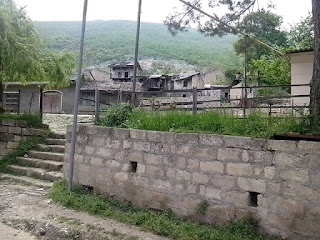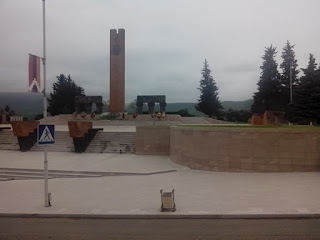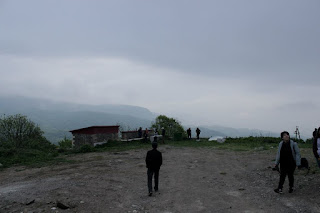Above is my bedroom wall. On the left, a map of Armenia with Artsakh from 2015. On the right, a map of Armenia as defined by the Treaty of Sevres, from 1920. Today, both maps are obsolete.
Thoughts on the Current Situation of Armenia and Artsakh
I am still coming to grips with the recent war that cost Artsakh most of
its land and crippled Armenia. The
Armenian genocide is best understood not as a singular event that occurred in
1915, but as an ongoing process that began when the Seljuk Turks invaded the
area in the 1070s and continues to the present. When people think about
genocides they think of the Holocaust, which was done very quickly, in one
dramatic, horrific event. But many, maybe even most genocides, happen across
centuries. It is slow, but methodical and carefully calculated. As it so
happens, committing a complete genocide is harder than it sounds. Whenever the
world is distracted enough, Turkey, and its partner Azerbaijan, take another
step toward its completion. If the organizers of this genocide (who to be fair
are not the regular citizens but their governments) have one virtue, it is
patience. It will not end until Armenians are gone. There will never be peace.
This war was the latest phase of the genocide. This is why it is ridiculous to
tell Armenians to “get over” the genocide because it happened a long time ago.
The genocide is ongoing. It has been going on for nearly a thousand years, and
it is happening right now. Russia may have the power to put the process on
pause, as it has done on and off for the past century, but for how long? As
long as they deem it advantageous to do so, obviously. They don’t do it out of
any sort of moral obligation. There are no morals involved in the way the world
works. If no other greater power is going to put a stop to the genocidal
process, as was completely demonstrated by the deafening silence from the
international community during this most recent war, and Armenia can’t defend itself against Turkey, then Armenia may only last
as long as Russia allows it to last. This is why Armenia must make itself
useful to Russia in order to survive. The West isn’t going to lift a finger to
help Armenia. At most they’ll shake their fists angrily at Turkey from far
away. But they will do nothing. It’s a bitter pill to swallow, to be sure.
Perhaps genocide is a typical
human behavior. Dividing ourselves into warring tribes, trying to eliminate
other tribes. Perhaps it dates back to when homo sapiens eliminated the
Neanderthals and other now-extinct hominids. Humans survived because they were
the most blood-thirsty and cruel of the hominids. They learned to fear and
dehumanize their enemies, which made the killing easier. With the rest of the
hominids gone, humanity turned on itself. Some of us grow past the
dehumanization of anyone different from themselves and are able to shut it off
when it creeps into their subconscious with some effort. But most do not. Racism and bigotry is a remnant from the days other hominids existed. This
little hypothesis of mine is the only thing that makes sense to me when videos
of Azeri soldiers mutilating Armenian prisoners of war, and even civilians, to
their death, surface online. I cannot bring myself to watch such things, but
knowing they exist is haunting enough to make me lose sleep. When you look at
this all from the outside, as perhaps an alien from another world would look at
it, and divorce nationalism from your thoughts, you see it for the madness that
it truly is. Sometimes I envy the Americans around me, so caught up in their
frivolous concerns, never having to worry about whether their country might not
exist tomorrow. So naive and blissfully ignorant. Their security was
accomplished through the genocide of Native Americans, of course. Meanwhile I
get to have these thoughts going through my head. Whenever I think or write
about something else (as I will soon on this blog, I promise), it is merely to
distract myself from this existential dread. I am beginning to think perhaps
those who do not have depression are just good at not thinking about the world
around them and keeping themselves distracted, with their heads in the sand.
I’m not very good at that. You might as well call excessive thinking a mental
illness.
In the aftermath of the
war, I have seen Armenians looking for someone to blame in all this. Some go
after Prime Minister Nikol Pashinyan. Maybe it is his fault. Some go after the
oligarchs who ruled before him. Maybe we should pin all the blame on them.
Maybe it’s both. I don’t know if I’m for or against Pashinyan myself, although I lean more towards being for him. But I don’t live in Armenia, so it doesn’t matter really. I will say that there
isn’t a politician on Earth that I fully trust, though. Some, who I think see
the bigger picture, see that everyone’s a little bit to blame. Perhaps there is
validity in that, and we should each look at our own guilt and self-reflect. I
lost a relative in the war; Hayk Mkrdchyan, a young man with too much life
ahead of him to die. My family in America was able to put together some money to send over to his immediate family, which made me feel better.
Like I had done something. But really, there wasn’t much I could do about this war.
Maybe my fault in all this was choosing to return to America after my time in
Armenia. I probably could have had a career there. My Masters degree in
Creative Writing would actually mean something over there, unlike here. But,
many people would have been upset with me if I made the decision to stay. In
the end, I didn’t choose Armenia when I had the chance. I chose my loved ones
and family. I would have felt some guilt no matter the choice I made, but I
admit my fault. I sure didn’t go back because I prefer America, though. I would
rather live in Armenia if it weren’t for my family. Although I would like to
move to Armenia with my family one day, who knows when I will actually have the
money to even do that. In 2015, I naively thought I would be back to visit
Armenia in a couple years, but I barely ever even get to travel to visit family
in California, let alone make trips to Armenia. Lack of time and money. My
individual choice not to stay may not have amounted to much, but too many
diasporans who could move to Armenia and unlike me actually have the means to,
don’t. And too many native Armenians leave. Perhaps the wealthy diasporans have
the same excuses I have. But if I were as wealthy as Cher or Serj Tankian, I'd
bring my wife and son over to live in Armenia, and still have plenty of money
to fly back to visit family in America once or twice a year. Anyway, you can
blame a million different things, but the loss of this war is our collective
shame. Even despite Turkey’s unexpected involvement (as I have heard, Armenia
may have been able to repel an attack from Azerbaijan alone, but not with
Turkey’s NATO-empowered army and Syrian mercenaries involved), it still didn’t
have to be this way. It could have ended worse too, but it also could have
ended a lot better.
Travels in Artsakh, 2015
The preceding rant may
as well have been a blog entry all its own. I don’t really know who I am
writing this blog entry for; if I really wanted to, I could try writing
something for the Armenian Weekly again. But, perhaps I would rather have a
smaller audience for this. Maybe it’s because of my distaste for online
arguments. Let me instead share the pictures of my trip to Artsakh in 2015, and
discuss the trip. To look back at my pictures from my trip to Artsakh in May of
2015 is heartbreaking now. To know that many of the buildings I saw are now in
ruins, to know that many of the cities and monasteries I visited are now in the
hands of Azerbaijan, and the history of the region will be cleansed and
rewritten, to know that a lot of the people I met may now be homeless or dead.
I will likely never be able to revisit some of these places. But, at the same
time, I feel that reflecting on these photos and sharing them is something I
must do. Part of the grieving process, perhaps. I must not forget the five days
I spent in Artsakh. Free, independent Artsakh, from 1994 to 2020. For a tiny
sliver of that time, I was there. I shared in its independence. It may have
been a short five days I spent there, but it was an important five days of my
life. Those days are even more important now than they felt when it happened.
These pictures are evidence of what was there before. Lest the world forget. We
live in a time when we can easily take photographs, unlike 1915.
I went on a trip
organized by Birthright Armenia. They were able to get us into places most
normal tourists wouldn’t have been able to. It was a long bus ride from
Yerevan, made longer by a stop at Tatev monastery in the Syunik province on the
way (not that I’m complaining of course, that’s a worthy trip in and of
itself). We arrived on May 8th, an important day in Artsakh, as the anniversary
of the Armenian liberation of the city of Shushi in 1992. We had a dinner party
at a fancy hotel in Shushi with some retired soldiers who fought in the war,
and danced together after dinner. We then stayed with a host as their guests,
almost a Bed and Breakfast kind of arrangement, in Shushi, which would be our
base of operations as we traveled elsewhere in Artsakh. I myself stayed with a
kindly old woman, who lived alone, having lost her family in Artsakh’s war of
independence in the early 1990s. I will always remember the breakfasts she put
together. Some of the most delicious food; the local cheese and honey was
amazing, something I have never tasted before or since. I don’t know what’s
become of her now. Now that Shushi is in Azeri hands.




















































































No comments:
Post a Comment